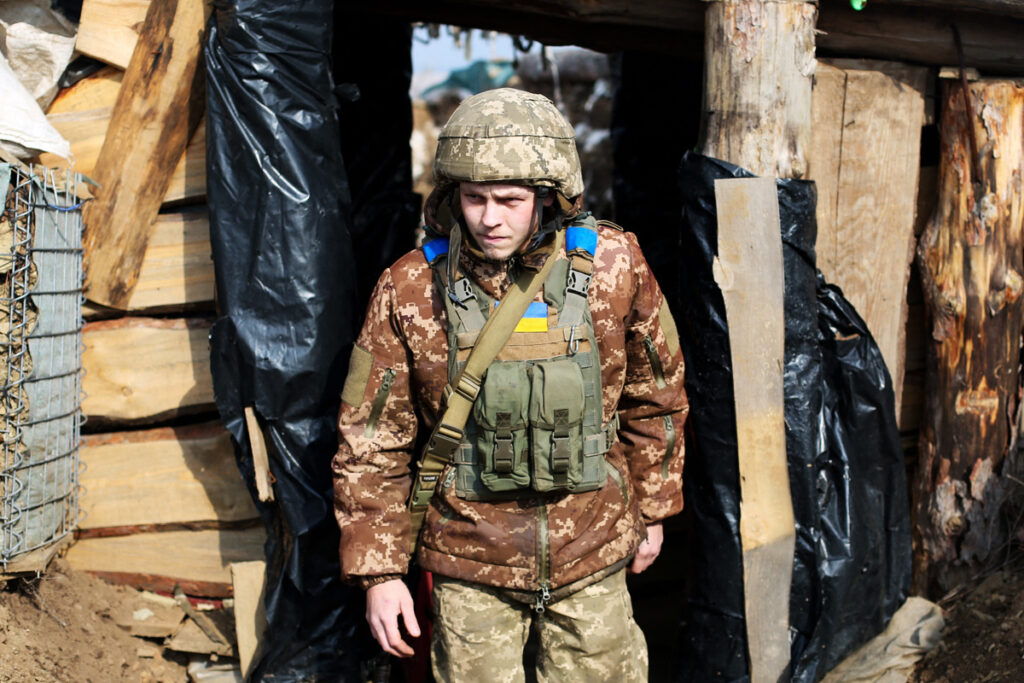Ukraine's security council has called out a nationwide state of emergency which is expected to last for 30 days as the situation between the country and Russia has further escalated.
The measure, which has to be formally approved by the parliament, applies to all parts of Ukraine except for its two Russian-backed eastern separatist regions, Donetsk and Luhansk, which Russia recognised as independent states, the council’s secretary Oleksiy Danilov said on Wednesday during a press conference.
A 30-day extension period is possible if the situation further worsens. The security council's report for added security measures is expected to be approved this week. According to Danilov, the country's regions would be able to select which particular measures to apply, “depending on how necessary they might be.”
This would include measures from blocking certain types of transport to checking more vehicles or people's documents.
Ukraine has also urged citizens living in Russia — an estimated three million people — to leave the country immediately, according to reports from Al Jazeera.
In a TV statement, Russian President Vladimir Putin said he is still ready to find "diplomatic solutions" to the current tensions with the West and Ukraine, however, the country has begun evacuating diplomats from Ukraine, according to Russian news agency TASS.
Belgian Prime Minister Alexander De Croo convened the country's National Security Council at 14:00 to discuss the situation in Ukraine, De Morgen reports. The meeting will include State Secretary for Asylum and Migration Sammy Mahdi, Chief of Defence Michel Hofman, the Belgian Ambassador to NATO Frédéric Van Leeuw and the National Crisis Centre, among others.
Sanctions imposed
The EU and its member states decided on Tuesday evening to impose the first package of targeted sanctions against Russia after its recognition of the two breakaway regions in eastern Ukraine and its sending of troops into the areas held by pro-Russian separatists.
The measures target those who were involved in the illegal decision, banks that are financing the Russian military and other operations in the breakaway regions, trade from the regions to and from the EU and Russia’s access to EU’s financial markets.
“This package of sanctions that has been approved by unanimity with the member states will hurt Russia, and it will hurt a lot,” EU High Representative for Foreign Affairs and Security Policy Josep Borrell asserted.
However, Ukraine's Foreign Affairs Minister Dmytro Kuleba called on western countries to do more. "To stop Putin from further aggression, we call on partners to impose more sanctions on Russia now," he said on Twitter.
"First decisive steps were taken yesterday, and we are grateful for them. Now the pressure needs to step up to stop Putin. Hit his economy and cronies. Hit more. Hit hard. Hit now."
To stop Putin from further aggression, we call on partners to impose more sanctions on Russia now. First decisive steps were taken yesterday, and we are grateful for them. Now the pressure needs to step up to stop Putin. Hit his economy and cronies. Hit more. Hit hard. Hit now.
— Dmytro Kuleba (@DmytroKuleba) February 23, 2022
Joe Biden, the President of the United States, announced the first tranche of sanctions which mainly target its large financial institutions and Russian sovereign debt, as well as Russian elites and their family members, and said that "if Russia goes further with this invasion, we stand prepared to take further steps as necessary."
Today, I announced the first tranche of sanctions in response to Russia’s actions in Ukraine. And if Russia goes further with this invasion, we stand prepared to take further steps as necessary. pic.twitter.com/8t87wyMq6q
— President Biden (@POTUS) February 23, 2022
The United Kingdom's Prime Minister Boris Johnson on Tuesday warned that "a European nation of 44 million men, women and children could become the target of a full-scale war of aggression, waged without a shred of justification," and announced several measures against Russia in response.
The UK is also sanctioning five Russian banks and three high net worth individuals involved in the ongoing action against Ukraine and has said it will freeze any assets they hold in the UK, alongside taking other economic measures against them.

